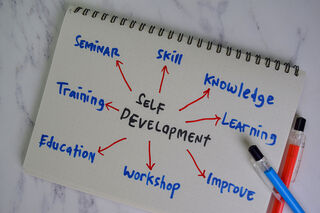Artificial Intelligence
Summer Self-Development the Peter Drucker Way
Determine your opportunities for the coming year.
Posted June 21, 2022 Reviewed by Ekua Hagan
Key points
- The slow pace of the summer season can provide more opportunities for self-reflection.
- Keeping a self-development notebook or computer file can help capture opportunities in education, networking, entrepreneurship, and more.
- Making time for thinking is often devalued by some, and can be difficult in today's current fast-paced society. Meditation and exercise may help.

Summer can be a valuable season for self-reflection, career/life planning, and self-development. For Peter Drucker, the father of modern management (1909-2005), this meant a combination of contemplation and planning, adhering to his belief that self-development arises from building on your strengths. Drucker also referred to core competencies, often thought of in terms of organizations, but which also apply to individuals. What can you do with a sense of excellence, and perhaps do better than most people? How can you build on that to improve, incrementally or otherwise?
In one of our interviews in 2005, seven months before his death at 95, he mentioned the following about his self-development planning exercise:
"Every year I do it in July," he said, referring to his assessment of the previous year, "and every year I’m surprised. Every year the things that worked are not the things I expected to work. And the things I expected to work are at best not failures. And every year, I redirect my priorities as a result of that test and a year later find out that I have not lived up to my priorities but have done something quite different. So, I have learned that one has to plan, but one doesn’t follow the plan."
This demonstrates that even for a highly accomplished and goal-directed person like Drucker, not everything is going to work well. What is particularly impressive is that he engaged in these activities long after he reached the top of his field and became famous.
Whether or not you take a vacation this summer, the pace of the world can be somewhat slower, leading to opportunities for self-reflection. In the same interview, he contended, “I think a more important lesson I’ve learned is that I need to look back every year on the results of the year and hold them against my expectations.”
In my interview with him for an article in USA TODAY around the time that his book The Daily Drucker was published in 2004, Drucker said he developed a framework after finishing an assignment or project. This framework fits in perfectly with summer self-development: He first asked himself what needed to be done now, and the answer would often lead to something new. He said that the difficult part was the follow-up question about determining what his priorities should be. “That takes me quite a while as a rule,” he said, “and a lot of agonizing. But it has to be asked and has to be answered.”
Self-development plays out in a number of ways in Drucker’s writing and teaching. “What matters,” he said in a 2002 interview with the publication Information Outlook, “is that the knowledge worker, by the time he or she reaches middle age, has developed and nourished a human being rather than a tax accountant or a hydraulic engineer.”
The idea of nourishing a human being has taken on extra resonance lately. With news accounts about startling gains in artificial intelligence/AI, the notion of what a human being can do to remain productive and relevant in the workplace of the future has taken on new urgency. Hardly anyone’s job seems safe from the relentless advancements in AI.
Your Own Self-Development
Keeping a self-development notebook or computer file will help capture opportunities relating to a variety of areas: education, networking, entrepreneurship, volunteering, new work opportunities, collaboration with new and different individuals and organizations, getting involved in new extracurricular activities, and other possibilities.
However it is accomplished, you have to carve out time for thinking, and then capturing and storing your best self-development ideas. Drucker believed that thinking is hard work and is devalued in our fast-paced, 24/7, always-on world. Activities like meditation can help clear your mind to make it easier to consider what really matters in your life, including how you draw purpose and meaning. Ideas can also arise from yoga and other mind/body activities, walking, running, or spending time in nature.
Bill Gates, the co-founder of Microsoft, has become one of the world’s most prominent thought leaders in the years since he stepped down as CEO and went on to lead the Bill & Melinda Gates Foundation. He has long made constructive use of what he calls “think weeks,” when he goes away for reading, reflection, and planning.
The point is to have time built into your schedule to get away from work to think deeply about where you have been and where you are going. Consider this roadmap for conceptualizing your inward journey:
- If you made plans a year ago, assess the results. Does your current reality reflect those plans?
- Whether you made specific plans last year or not, decide what worked during the year and what didn’t.
- Determine opportunities for the coming year.
- Map a plan for the coming year, and then repeat these steps in summer 2023.
Think about your life, both as it is now and where you’d like it to go. Consider not just your work, but also your life outside of work-family, friends, interests, activities, and pursuits. Assess what’s working, what’s not, and what you might want to add or subtract to create more satisfaction and fulfillment.
For Peter Drucker, self-development was truly the work of a lifetime. It can be the same for anyone, with the proper attention. Summer 2022 can provide the perfect time to start on this journey. Your summer 2023 self will thank you for it!
References
Peter F. Drucker (with Joseph A. Maciariello) The Daily Drucker: 366 Days of Insight and Motivation for Getting the Right Things Done (HarperBusiness, 2004)
Bruce Rosenstein: Create Your Future the Peter Drucker Way: Developing and Applying a Forward Focused Mindset (McGraw-Hill, 2013)
Bruce Rosenstein: Living in More Than One World: How Peter Drucker's Wisdom Can Inspire and Transform Your Life (Berrett-Koehler, 2009)




